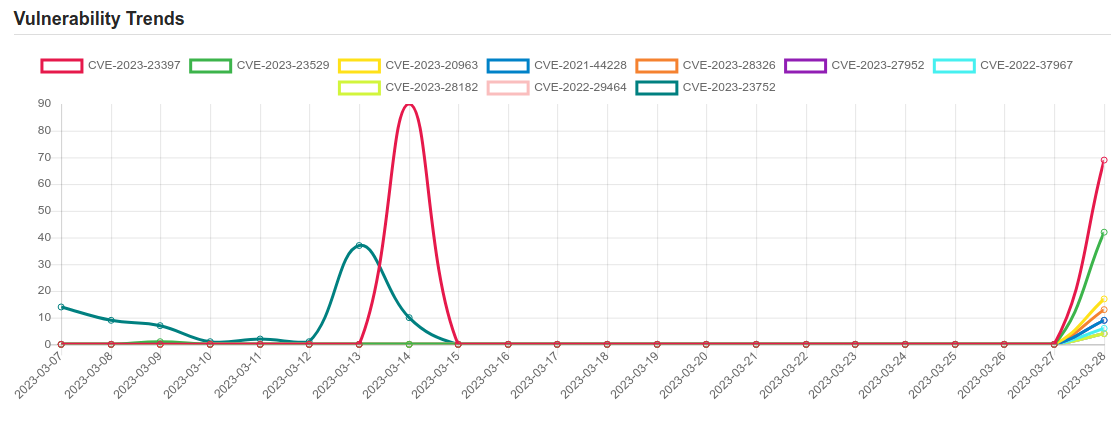Daily Vulnerability Trends: Wed Mar 29 2023

| CVE NAME | CVE Description |
| CVE-2023-20963 | In WorkSource, there is a possible parcel mismatch. This could lead to local escalation of privilege with no additional execution privileges needed. User interaction is not needed for exploitation.Product: AndroidVersions: Android-11 Android-12 Android-12L Android-13Android ID: A-220302519 |
| CVE-2021-44228 | Apache Log4j2 2.0-beta9 through 2.15.0 (excluding security releases 2.12.2, 2.12.3, and 2.3.1) JNDI features used in configuration, log messages, and parameters do not protect against attacker controlled LDAP and other JNDI related endpoints. An attacker who can control log messages or log message parameters can execute arbitrary code loaded from LDAP servers when message lookup substitution is enabled. From log4j 2.15.0, this behavior has been disabled by default. From version 2.16.0 (along with 2.12.2, 2.12.3, and 2.3.1), this functionality has been completely removed. Note that this vulnerability is specific to log4j-core and does not affect log4net, log4cxx, or other Apache Logging Services projects. |
| CVE-2023-28326 | Vendor: The Apache Software Foundation Versions Affected: Apache OpenMeetings from 2.0.0 before 7.0.0 Description: Attacker can elevate their privileges in any room |
| CVE-2023-27952 | No description provided |
| CVE-2022-37967 | Windows Kerberos Elevation of Privilege Vulnerability |
| CVE-2023-28182 | No description provided |
| CVE-2022-29464 | Certain WSO2 products allow unrestricted file upload with resultant remote code execution. The attacker must use a /fileupload endpoint with a Content-Disposition directory traversal sequence to reach a directory under the web root, such as a ../../../../repository/deployment/server/webapps directory. This affects WSO2 API Manager 2.2.0 and above through 4.0.0; WSO2 Identity Server 5.2.0 and above through 5.11.0; WSO2 Identity Server Analytics 5.4.0, 5.4.1, 5.5.0, and 5.6.0; WSO2 Identity Server as Key Manager 5.3.0 and above through 5.10.0; and WSO2 Enterprise Integrator 6.2.0 and above through 6.6.0. |
| CVE-2023-23752 | An issue was discovered in Joomla! 4.0.0 through 4.2.7. An improper access check allows unauthorized access to webservice endpoints. |
| CVE-2022-33942 | Protection mechanism failure in the Intel(R) DCM software before version 5.0 may allow an unauthenticated user to potentially enable escalation of privilege via adjacent access. |
| CVE-2022-47986 | IBM Aspera Faspex 4.4.2 Patch Level 1 and earlier could allow a remote attacker to execute arbitrary code on the system, caused by a YAML deserialization flaw. By sending a specially crafted obsolete API call, an attacker could exploit this vulnerability to execute arbitrary code on the system. The obsolete API call was removed in Faspex 4.4.2 PL2. IBM X-Force ID: 243512. |
| CVE-2022-46169 | Cacti is an open source platform which provides a robust and extensible operational monitoring and fault management framework for users. In affected versions a command injection vulnerability allows an unauthenticated user to execute arbitrary code on a server running Cacti, if a specific data source was selected for any monitored device. The vulnerability resides in the `remote_agent.php` file. This file can be accessed without authentication. This function retrieves the IP address of the client via `get_client_addr` and resolves this IP address to the corresponding hostname via `gethostbyaddr`. After this, it is verified that an entry within the `poller` table exists, where the hostname corresponds to the resolved hostname. If such an entry was found, the function returns `true` and the client is authorized. This authorization can be bypassed due to the implementation of the `get_client_addr` function. The function is defined in the file `lib/functions.php` and checks serval `$_SERVER` variables to determine the IP address of the client. The variables beginning with `HTTP_` can be arbitrarily set by an attacker. Since there is a default entry in the `poller` table with the hostname of the server running Cacti, an attacker can bypass the authentication e.g. by providing the header `Forwarded-For: |
| CVE-2023-28858 | redis-py before 4.5.3, as used in ChatGPT and other products, leaves a connection open after canceling an async Redis command at an inopportune time (in the case of a pipeline operation), and can send response data to the client of an unrelated request in an off-by-one manner. The fixed versions for this CVE Record are 4.3.6, 4.4.3, and 4.5.3; however, CVE-2023-28859 is a separate vulnerability. |
| CVE-2023-1674 | A vulnerability was found in SourceCodester School Registration and Fee System 1.0 and classified as critical. This issue affects some unknown processing of the file /bilal final/login.php of the component POST Parameter Handler. The manipulation of the argument username leads to sql injection. The attack may be initiated remotely. The exploit has been disclosed to the public and may be used. The associated identifier of this vulnerability is VDB-224231. |
| CVE-2022-24521 | Windows Common Log File System Driver Elevation of Privilege Vulnerability. This CVE ID is unique from CVE-2022-24481. |
| CVE-2023-0241 | pgAdmin 4 versions prior to v6.19 contains a directory traversal vulnerability. A user of the product may change another user’s settings or alter the database. |
A considerable amount of time and effort goes into maintaining this website, creating backend automation and creating new features and content for you to make actionable intelligence decisions. Everyone that supports the site helps enable new functionality.
If you like the site, please support us on “Patreon” or “Buy Me A Coffee” using the buttons below




To keep up to date follow us on the below channels.





